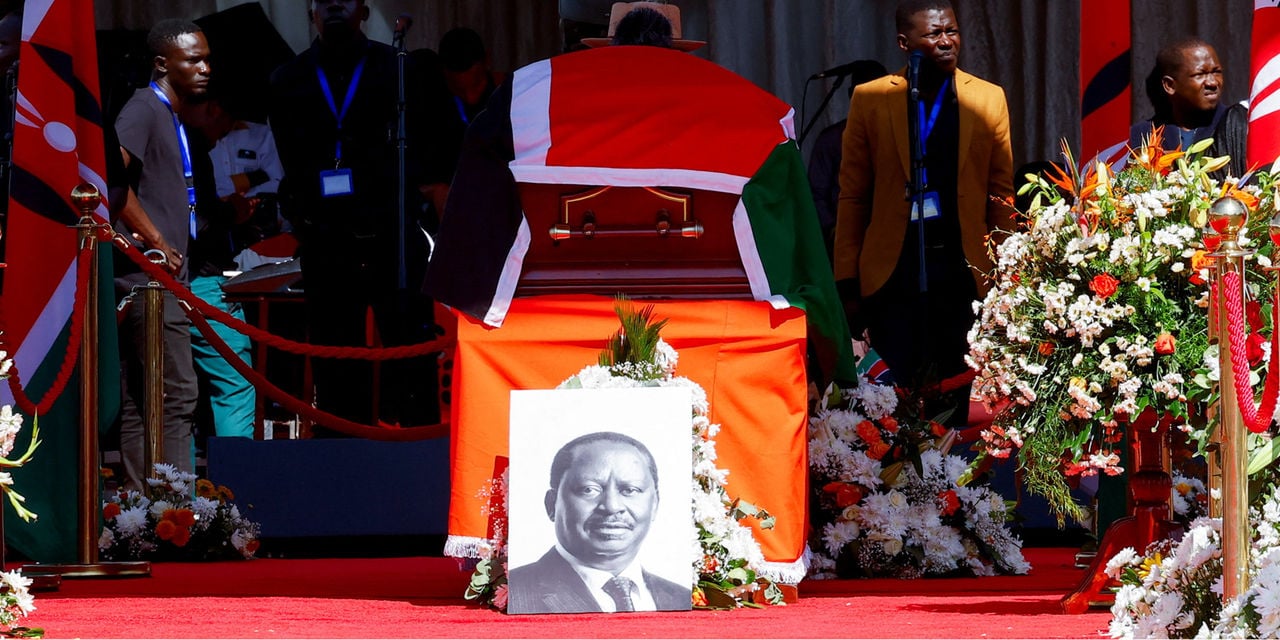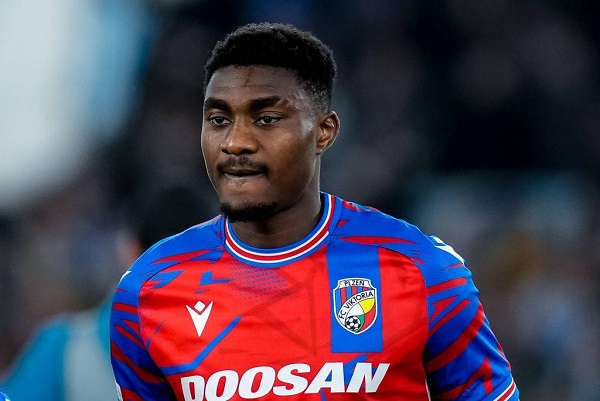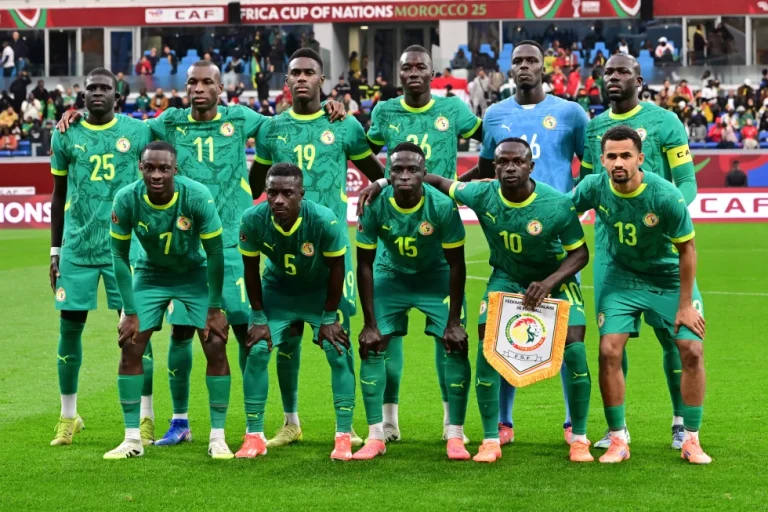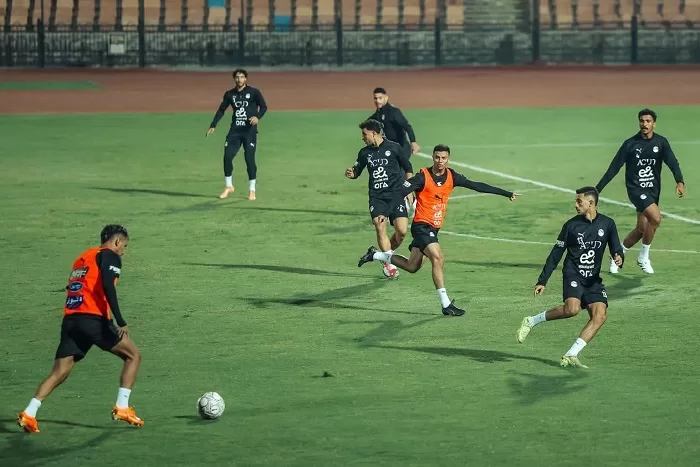
Former Prime Minister Raila Amolo Odinga’s defiance did not begin in politics.
It was bred in the dusty cotton fields of Nyamira in Bondo, Siaya County, moulded in the strict classrooms, and tested in the unforgiving hands of his father, Jaramogi Oginga Odinga — Kenya’s first Vice President.
As his siblings recalled in emotional tributes during his funeral service at the Jaramogi Oginga Odinga University of Science and Technology (JOOUST) in Bondo on Sunday, Mr Odinga was never one to conform.
From childhood, he stood firm on his convictions, even when it meant questioning authority — be it his father, his teachers, or even the law.
Dr Oburu Oginga, Mr Odinga’s elder brother, said that his late sibling’s independent spirit was evident early in life.
Recounting their childhood days in Nyamira, Dr Oginga described his younger brother as “a very caring and expressive boy” who was never afraid to speak his mind.
“Our father was a strict man,” he recalled. “Every weekend when he came home from Kisumu, he expected us to be picking cotton because this area was known for cotton growing. But at one time, Raila refused and told our father, ‘You know it’s hard to pick cotton. Why don’t you try it too?”
That defiance, Dr Oginga, also the Siaya senator, said, was not born out of arrogance but conviction — a sense of fairness that would later define his brother’s political ideology.
“He was fearless even as a boy. He questioned things that he felt didn’t make sense, even to our father,” he said.
Jaramogi, a man known for his towering intellect and strict discipline, was not used to being challenged — least of all by his own son.
But Mr Odinga’s refusal to bend easily set the tone for a lifelong pattern; he would not submit to power for power’s sake.
Dr Wenwa Akinyi, Mr Odinga’s younger sibling, painted a picture of a boy who carried the same spirit of defiance into school.
“Raila was a strong-headed boy. He loved school and was always among the top students. But he was also very firm,” she said.
At Maranda School, Dr Wenwa recalled, there was a rule that students who were caned had to salute their teacher and say, “Thank you, teacher.” Mr Odinga refused.
“There was a rule that if you were caned, you had to salute and thank the teacher. But Raila refused to do it,” Dr Wenwa said.
“He would simply get up and walk away, and the teacher would cane him again until he gave up and told the teacher that his father had asked for permission to have him out of school yet he was still being caned.”
This defiance, Dr Wenwa said, was not disrespect but principle.
“He could not understand why he should thank someone for beating him. That was Raila — always questioning authority and standing up for what he believed was right,” she added.
Later in life, those same traits became the foundation of his leadership style.
When Mr Odinga served as Deputy Director at the Kenya Bureau of Standards (Kebs) in the late 1970s and 1980s, Dr Wenwa recollected that he was firm and uncompromising on discipline and integrity.
“He was very strict,” she said. “If you worked under him, you could not come late. He even introduced an attendance register. He believed in professionalism and accountability.”
Mr Odinga’s insistence on structure and transparency at Kebs reflected the same discipline his father instilled in them — though he expressed it differently, the sister said.
Dr Oginga also recalled how his younger brother’s courage shone through even in the darkest of times — during his detention years in the 1980s and 1990s when he was accused of treason.
“When he was charged with treason, he was calm and unshaken,” Dr Oginga said. “He wore the black uniform reserved for death row inmates, but he was never afraid. He faced it with courage.”
The late ODM leader’s siblings said those years tested the entire family, but none more than Mr Odinga himself, who spent nine years behind bars.
“He suffered for this country,” said his younger sister, Ruth Odinga, her voice heavy with emotion.
“Being in detention for nine years is not a joke. He was a tough man. It is not easy to see someone so strong lying there lifeless after fighting for so long.”
The Kisumu Woman Representative, who described his brother as her “confidant and adviser,” said the family endured immense pain because of his political struggles.
“Our family has suffered because he sacrificed himself for Kenya,” she said. “He died still crying for the country. Many never saw the pain he carried, but he bore it for the sake of freedom and justice.”
She recalled the long, painful nights when Mr Odinga was detained, the constant fear of the unknown, and the unrelenting strength of their mother, Mary Ajuma Odinga, who held the family together.
“It was not easy,” Ms Odinga said. “He was our protector, our guide, and our pillar. Kenya has lost a hero, but we have lost a brother who gave everything for others.”
Beyond politics, Dr Oginga reminisced about his brother’s softer side — his love for sports and community.
“He was a great lover of football,” he said. “He supported Arsenal and was a patron of Gor Mahia. I remember recently when Kenya was playing at Kasarani, he went with President Ruto to cheer the national team, and Kenya won. The only time we lost was when both of them were absent.”
Even in his final days, Dr Oginga revealed, Mr Odinga remained optimistic and deeply connected to Kenya’s progress.
“When he was taken ill, it was President Ruto who planned and paid for his trip to India,” he said. “I want to thank the President for standing with our family, and also thank Prime Cabinet Secretary Musalia Mudavadi, who led the delegation that brought my brother’s body home.”
Dr Oginga, who is also the Odinga family spokesperson and now the acting ODM party leader, also expressed gratitude to Deputy President Prof Kithure Kindiki for his support in organising the state funeral.
“My brother’s personal doctor, Dr Oluoch Olunya, stood with him throughout, as did his aide Maurice Ogeta, his daughter Winnie, and our sister Ruth,” said Dr Oginga. “We thank them all.”
In a moving appeal, he asked President Ruto to promote his late brother’s security staff, saying they had served the late leader faithfully for years.
Ms Odinga, the Kisumu Woman Rep, also turned her attention to the political future.
Her message was clear: unity was the greatest tribute they could offer her brother.
“ODM must remain one,” she declared. “That’s what Raila stood for — unity, peace, and justice. We cannot afford to let the party disintegrate.”
From his defiance as a young boy to his final days as a national icon, Mr Odinga’s story — as told by his siblings — is that of a man who lived by conviction, not convenience.
He challenged his father, his teachers, and even oppressive regimes, guided always by his own sense of justice.
As his family bid him farewell, it was clear that Mr Odinga’s “indomitable spirit lives on — not only in Kenya’s history books but also in the hearts of those who knew him best.”
Ms Odinga spoke of the immense struggles her brother endured in the fight for democracy and justice, often at the expense of his health and family.
“You have suffered for this country, and many could not see it. Go rest now, my brother. You have done your part.”
She said Mr Odinga’s dedication to Kenya came with a deep personal cost.
“Our family has suffered because he sacrificed himself for Kenya. He died still crying for the country.”
She described her brother as a strong man, one not easily shaken, but said it was painful to see him lying lifeless after years of tireless struggle.



